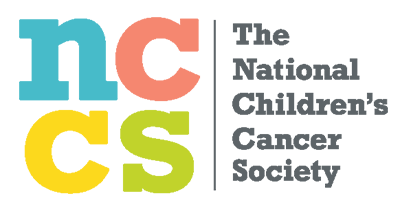Mission & History
Meet Luke - Leukemia warrior
What we do
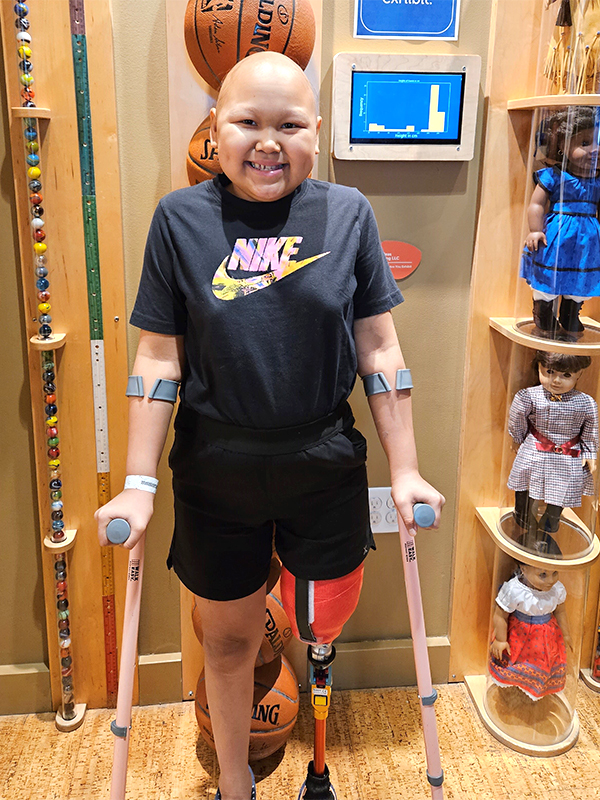
Mission
The National Children’s Cancer Society (NCCS) provides emotional, financial, and educational support to children with cancer, their families, and survivors.
Vision
A world in which all childhood cancer patients become childhood cancer survivors.
The NCCS is a 501C(3) non-profit organization that is proud to meet all of the Better Business Bureau’s “Standards of Charity Accountability,” which includes a comprehensive, in-depth evaluation of charity governance, fundraising practices, solicitations, and informational materials. The organization also earned the Platinum GuideStar Nonprofit Profile Seal of Transparency, the highest level of recognition offered by GuideStar, the world’s largest source of nonprofit information.
About Us
The National Children’s Cancer Society (NCCS) has compassionately supported families impacted by childhood cancer, from diagnosis and treatment to remission and beyond, for nearly 40 years. Since 1987, over 50,000 families across the United States have received support from the NCCS through a range of evolving services that meet their unique and immediate needs. Through financial, educational, and emotional support programs, families never have to face their fight alone. With $71 million in direct financial assistance provided, the NCCS’s commitment to its families remains unwavering. On the global front, over 204,000 children with cancer in 53 countries have received lifesaving care thanks to medical donations valued at over $471 million. The generosity of our donors helps us keep families strong, positive, and most importantly, together.
Our Story
Christmas of 1986 was a time of both hope and heartbreak for Mark and Carol Stolze. They were visiting a friend in the hospital battling stage 4 Hodgkin’s disease. Despite undergoing numerous treatments, her cancer had not diminished, and she faced a grim prognosis: without a bone marrow transplant, her chances of survival were slim. As she cried, she revealed her fears not only about her own fate but also the financial burden her family, already struggling in their rural home, would face. The transplant was prohibitively expensive, and with only 12 hospitals in the U.S. equipped for the procedure and insurance companies reluctant to cover it, her situation seemed nearly hopeless.
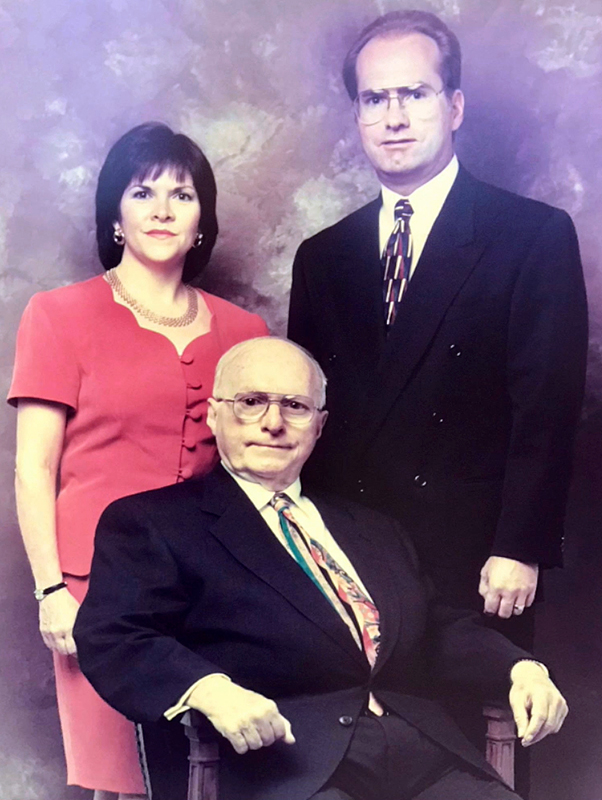 Moved by their friend’s plight, Mark and Carol were determined to help but felt overwhelmed by the lack of resources. The head of the transplant unit explained the dire situation: while the procedure was potentially lifesaving, without financial means, the hospital could only offer palliative care. Mark was shocked to learn that, in the previous year alone, around 30 children had been turned away due to financial barriers despite their critical need for treatment.
Moved by their friend’s plight, Mark and Carol were determined to help but felt overwhelmed by the lack of resources. The head of the transplant unit explained the dire situation: while the procedure was potentially lifesaving, without financial means, the hospital could only offer palliative care. Mark was shocked to learn that, in the previous year alone, around 30 children had been turned away due to financial barriers despite their critical need for treatment.
With a background in the jewelry business, Mark was initially unfamiliar with the challenges faced by families dealing with childhood cancer. However, as he immersed himself in understanding these hardships, he felt compelled to act. Six months later, with his wife, Carol, and his father, Alvin, The National Children’s Cancer Society was founded. He knew the organization’s success hinged on raising significant funds. Partnering with a telemarketing agent, the NCCS quickly made an impact, covering the cost of eight to 12 bone marrow transplants in its first year.
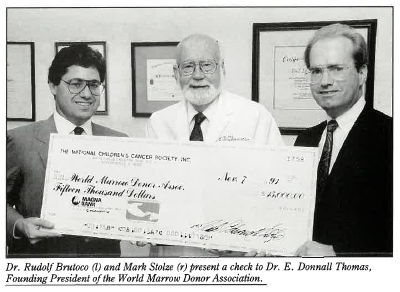 Mark soon discovered that insurance companies also refused to cover the cost of harvesting bone marrow, a crucial part of the transplant process. The NCCS began funding bone marrow donor searches and harvesting procedures to address this. As advancements in healthcare made bone marrow transplants a standard treatment for many cancers, insurance companies began covering these procedures. The NCCS adapted by focusing on other unmet needs families faced, such as transportation, lodging, and meals—expenses that often created significant barriers to receiving consistent treatment.
Mark soon discovered that insurance companies also refused to cover the cost of harvesting bone marrow, a crucial part of the transplant process. The NCCS began funding bone marrow donor searches and harvesting procedures to address this. As advancements in healthcare made bone marrow transplants a standard treatment for many cancers, insurance companies began covering these procedures. The NCCS adapted by focusing on other unmet needs families faced, such as transportation, lodging, and meals—expenses that often created significant barriers to receiving consistent treatment.
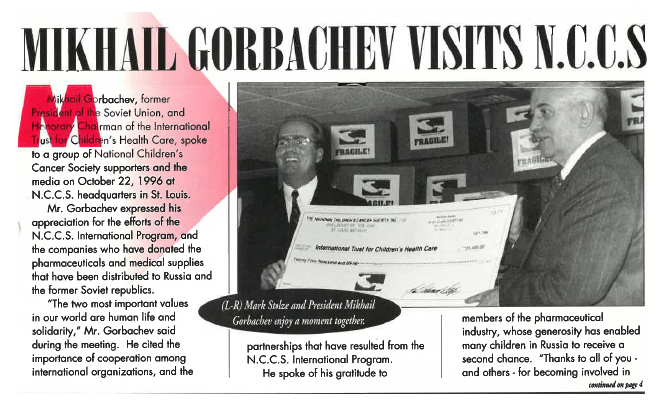 In the sixth year of its operation, the NCCS received an unexpected and unique offer from a pharmaceutical company to donate excess chemotherapy drugs. At the same time, a Russian oncology facility requested chemotherapy donations for its young patients. These events highlighted the severe shortage of medical resources in impoverished countries, leading to the creation of the Global Outreach Program—the first pharmaceutical drug donation program specifically focused on pediatric cancer.
In the sixth year of its operation, the NCCS received an unexpected and unique offer from a pharmaceutical company to donate excess chemotherapy drugs. At the same time, a Russian oncology facility requested chemotherapy donations for its young patients. These events highlighted the severe shortage of medical resources in impoverished countries, leading to the creation of the Global Outreach Program—the first pharmaceutical drug donation program specifically focused on pediatric cancer.
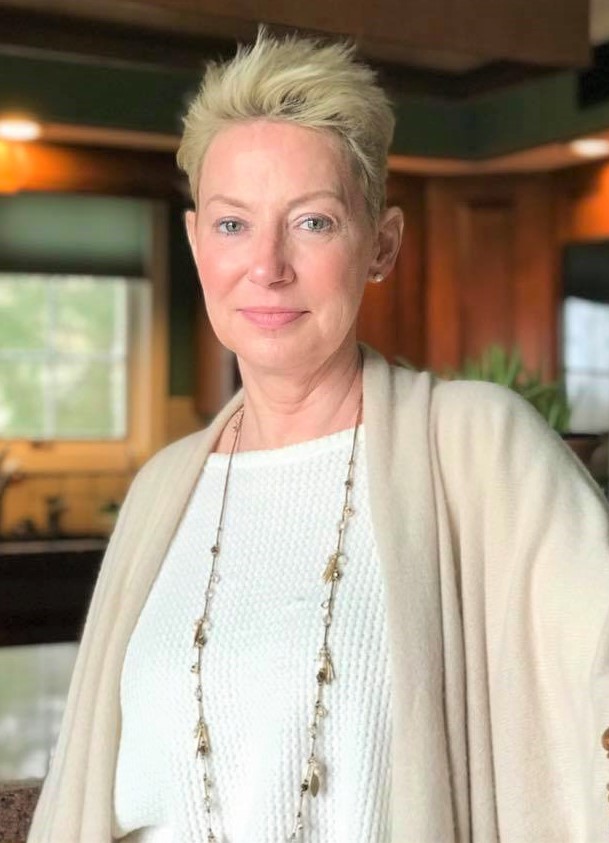 Michele Hertlein led the Global Outreach Program for 24 years, demonstrating unwavering dedication before her own battle with cancer. Her personal experience with the disease deepened her understanding of the critical need for accessible cancer care, particularly for children. Through her leadership, she identified and addressed the urgent needs of hospitals in low- and middle-income countries, significantly impacting and saving countless lives.
Michele Hertlein led the Global Outreach Program for 24 years, demonstrating unwavering dedication before her own battle with cancer. Her personal experience with the disease deepened her understanding of the critical need for accessible cancer care, particularly for children. Through her leadership, she identified and addressed the urgent needs of hospitals in low- and middle-income countries, significantly impacting and saving countless lives.
Over the years, the NCCS recognized that combating childhood cancer required more than financial support. Emotional support became a crucial aspect of their services. The organization’s case managers offer compassionate, individualized support, helping families navigate their unique challenges and providing tailored referrals and resources.
Entering remission is exciting, but the journey is far from over. To support survivors, the NCCS established the Beyond the Cure program, which provides resources and tools for living healthier post-treatment. This includes the Late Effects After Treatment Tool (LEATT) and the Beyond the Cure Ambassador Scholarship Program, helping survivors thrive long after their initial battle with cancer.
From diagnosis and treatment to survivorship and beyond, the NCCS continues to be a reliable source of support in an uncertain world, dedicated to walking alongside families every step of the way.
